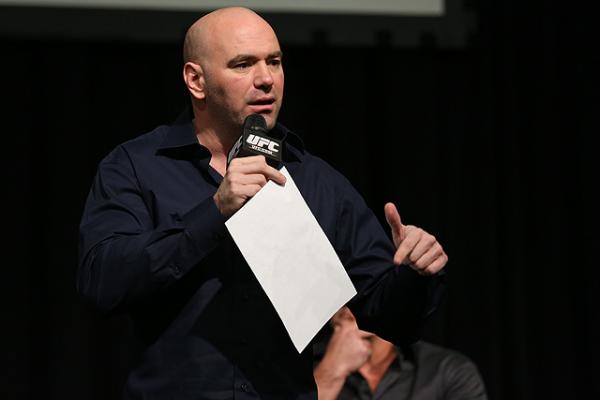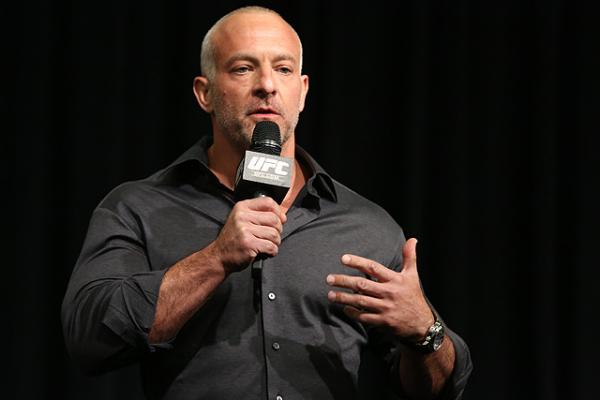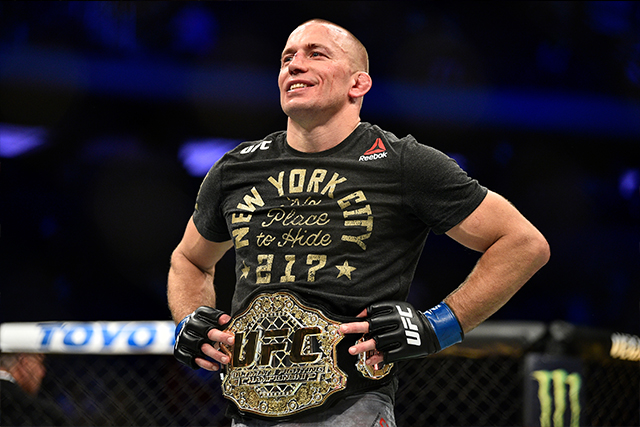UFC Fight Pass: ‘It’s A Big Bet’

UFC
Chief Content Officer Marshall Zelaznik is no stranger to the
content delivery business. | Dave Mandel/Sherdog.com
LAS VEGAS -- You knew Fight Pass was going to be a big deal when Zuffa sent out their big guns to address the assembled media before UFC 168 this past weekend.
UFC CEO Lorenzo Fertitta and President Dana White were quick to highlight the myriad content offerings their fans can now enjoy with their groundbreaking new digital platform. From dark fights from the company’s days of being banned from cable television to scraps from a number of the organizations they have acquired over the years and even new original programing scheduled for the service, the UFC has gone in big as they try to create what Fertitta described as “Netflix for fight fans.”
Advertisement
This effort shows how much stock the company has put into developing their global brand and how much they value continued international expansion at a time when the North American market has seemed to plateau if not retract a bit.
UFC Chief Content Officer Marshall Zelaznik, the architect of Fight
Pass, spoke with Sherdog.com about the planning that went into
creating the service and the organization’s goals for the new
content delivery medium.
“This is a bet, this is a big bet,” said Zelaznik. “It really wasn’t that difficult of a decision because this was Lorenzo and Dana’s vision. We have strategy meetings and this was, at the beginning of the year, one of the objectives we wanted to figure out how to do this and it all seemed to come together in a perfect storm. It wasn’t that difficult; these are aggressive businessmen, they take big chances and we feel pretty bullish on this.”
A lot of emphasis from executives at the UFC has centered on the pioneering nature of this service and when people blaze a new trail, often times there is quite a bit of risk involved.
Ferttita and White have been down this road before. They bankrolled the first season of “The Ultimate Fighter” along with co-owner Frank Fertitta in 2004, a decision that turned around the fortunes of the then-scuffling organization.
The risk that time was an estimated $10 million in production costs: a sum that looks paltry now when compared to the company’s reported revenues, but was quite significant at the time seeing how they were neck-deep in red ink from their first few years in control of the brand.
This risk is quite different yet still significant.
The UFC, as a sport’s property, has been at the vanguard in the digital space. They were the first relevant and perhaps only league to encourage their athletes to utilize social media, namely Twitter, as a means of growing their personal brands and in doing so push the UFC name to the far corners of the cyber world.
Now they are setting off down a new path that hasn’t been trod down before. While other leagues have created their own television networks, something the UFC considered before signing their landmark deal with Fox Sports in 2011, Zuffa brass have seen the streaming services that are threatening the old-guard television providers and banked on it being a considerable part of future of content distribution.
“It’s a different business in this environment,” said Zelaznik, the former vice president of pay-per-view giant In Demand. “For sure, the economics are totally different. These groups, these streaming groups didn’t invest in laying the cable, in laying the pipe, and getting this infrastructure built so they don’t have these huge debts they’re carrying like the Comcasts of the world.”
The decision not to go the UFC television network route was not fruitless.
“I was still in London at that time and was peripherally involved in those discussions when we were looking at acquiring a network and launching the UFC Network,” said Zelaznik. “I don’t think this ‘Over the top’ strategy probably was discussed but I can tell you that when we did all the work that was associated with that network, in terms of all of the programming that we would add to it, I grabbed all that material and started working with [UFC Senior Vice-President of Production and Operations] Craig [Borsari]’s group to produce the kind of stuff we will need.”

Photo: D.
Mandel/Sherdog.com
Dana White embraces innovation with the
Ultimate Fighting Championship brand.
Information about this side of the business is second hand at best and often very speculative, but sources close to the company have claimed that revenue collected from PPV sales are split nearly equally between providers and the promotion. This percentage has increased significantly over the years as they have grown into the world’s leading pay-per-view broadcaster.
But 50 percent is a whole lot less than 100 percent.
Having a service like Fight Pass could provide a vehicle to deliver the company’s bread and butter -- lucrative pay-per-views – to fans all around the world.
This may be a ways down the road. The UFC has just embarked on the journey, but it seems to be the pot of gold at the end of the rainbow for the biggest fight-promoting company.
Though he was not ready to plant the company flag squarely on the porch of their PPV partners and stake his claim, Zelaznik did entertain the possibility, one that could generate a huge jump in revenue from their core business.
In the mean time, the big job for the organization will be recruiting people to sign up for the service. Not an easy task in on online world where people have been raised to expect content for free: legal or otherwise.
At $9.99 per month it shouldn’t be too tough to get hardcore fans onboard, especially with exclusive live fights. Yet converting casual fans to consumers of this product will be a bit more daunting.
“Most of the focus group testing we did was with avids; these hardcores, we wanted to know what they thought because we do think this speaks to them initially, but the way we convert the others is through the original programming,” stated Zelaznik. “These live fights; if you’re a sampler of the product and there is a live fight coming up, like this one with [Alexander] Gustaffson, you’re like, ‘What’s this guy up to, can he come back and compete?’ I think that will translate and there will be moments in the life cycle of this, there will be little peaks where people come in and say, ‘Yeah, I’m going to give this a shot,’ and they’ll like it and stay or they will churn out. This is a business where it will be interesting to the watch the churn, how many people come and go and come and go. It is like a real network in that regard even though it is a service to us.”
In the end the decision to go this route came down to investing in the future of the UFC.
“Obviously could we have sold these products somewhere else and made more money?” asked Zelaznik. “Probably, the answer is probably yes, but I think this is the right investment in our company and in the business and in the technology and in our content.”
It’s been quite a year for Zelaznik and his team but the fruit of their labor is now available.
“
are aggressive businessmen,
they take big chances and
we feel pretty bullish on this.”
”
Fight Pass is now live and available for free during the trial period that runs through Feb. 28.
Related Articles








